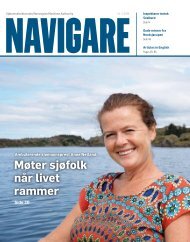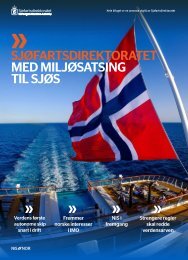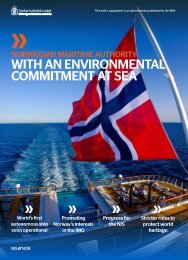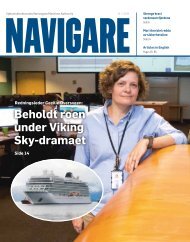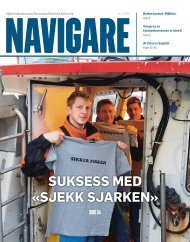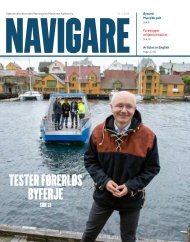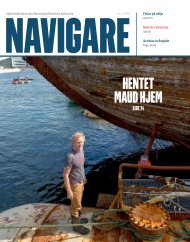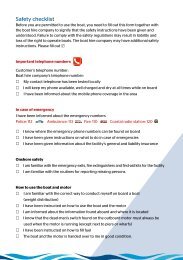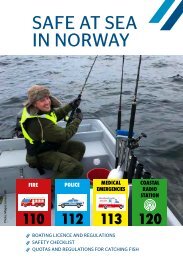Navigare 2- 2017
You also want an ePaper? Increase the reach of your titles
YUMPU automatically turns print PDFs into web optimized ePapers that Google loves.
NEWS<br />
ENGLISH TRANSLATION FROM PAGE 40<br />
Fisheries sector:<br />
Legislation for working conditions enters<br />
into force this autumn<br />
The Work in Fishing Convention (ILO 188) was adopted at the ILO International Labour Conference.<br />
Norway ratified the Convention in January 2016, but the new legislation will not enter into force until<br />
16 November <strong>2017</strong>, one year after Lithuania as the tenth nation, ratified the Convention.<br />
GEIRMUND EIKJE, NMA<br />
The objective of this Convention is to<br />
ensure that fishers have decent conditions<br />
of work on board fishing vessels<br />
with regard to minimum requirements for<br />
work on board, conditions of service,<br />
accommodation and food, occupational<br />
safety and health protection, medical care<br />
and social security.<br />
Most of the provisions of ILO 188 are<br />
already articulated in Norwegian legislation,<br />
so the Convention does not introduce many<br />
changes for Norwegian fishers.<br />
Minimum age requirement<br />
The new legislation will nevertheless have<br />
consequences on some levels. The Convention<br />
sets the minimum age for work on board<br />
a fishing vessel at 16 years. The minimum<br />
age is set at 15 for persons who are no longer<br />
subject to compulsory schooling and who are<br />
engaged in vocational training in fishing. The<br />
current Regulations on work and placement<br />
of young people on Norwegian ships have<br />
not set a minimum age limit and will be<br />
considered amended as a result of the new<br />
age requirements of ILO 188.<br />
Medical certificate<br />
According to the new Convention, all fishers<br />
are required to have a valid medical certificate<br />
demonstrating that they are medically fit to<br />
perform their duties. However, fishers working<br />
on a fishing vessel of 24 metres in length and<br />
over or who normally remain at sea for more<br />
than three days may be exempt from this<br />
requirement. Current Norwegian legislation<br />
(Regulations of 5 June 2014 No. 805 on the<br />
medical examination of employees on Norwegian<br />
ships and mobile offshore units) does not<br />
PHOTO: NMA<br />
reflect the scope of the new Convention and<br />
will be revised as a result of this amendment.<br />
According to the current legislation, a valid<br />
medical certificate is already a condition for<br />
being issued a Certificate for Master Fisherman<br />
Class A and B and a certificate of<br />
competence as engineer officer.<br />
Minimum safe manning<br />
The new Convention also states that a<br />
competent authority (the Norwegian Maritime<br />
Authority) shall establish a minimum<br />
safe manning for vessels of 24 metres in<br />
length and over, which will result in a revision<br />
of the existing Regulations on manning<br />
of Norwegian ships.<br />
Even though there is currently no formal<br />
requirement for fishing vessels to have safe<br />
manning documents, the shipping company<br />
shall, pursuant section 15 of the Ship Safety<br />
and Security Act, cf. section 6, ensure that<br />
the ship is safely manned, including that the<br />
persons who are working on board possess<br />
the necessary qualifications and certificates.<br />
Consequently, the introduction of a requirement<br />
for safe manning documents does not<br />
affect any vessel currently operating with a<br />
crew having the necessary qualifications and<br />
certificates and consisting of enough persons<br />
to cover these functions while complying<br />
with the requirements for periods of rest.<br />
Requirements for crew list<br />
The Convention also requires that every<br />
fishing vessel carry a crew list, and this information<br />
shall be sent to the designated person<br />
or persons ashore before or immediately after<br />
departure. Such persons shall be designated<br />
by the company.<br />
The purpose is that information on the<br />
identity of persons on board must be available,<br />
for example, in case something happens<br />
to the vessel. It is natural that this is part of<br />
the company›s safety management system,<br />
but the NMA will consider the need for<br />
amending existing regulations as a result of<br />
the requirement to make a crew list.<br />
Inspection document<br />
Another amendment arising from the new<br />
convention is that fishing vessels remaining at<br />
sea for more than three days are required to<br />
carry a document stating that the vessel<br />
complied with the provisions of the Convention<br />
at the time of the inspection. This applies<br />
to vessels of 24 metres in length and over and<br />
to vessels of less than 24 metres which usually<br />
operate in the trade area Deepsea fishing.<br />
The inspections in accordance with ILO 188<br />
are planned to be carried out simultaneously<br />
with the initial and renewal inspections of the<br />
vessel›s trading certificate.<br />
<strong>Navigare</strong> 2 - <strong>2017</strong> | 65










